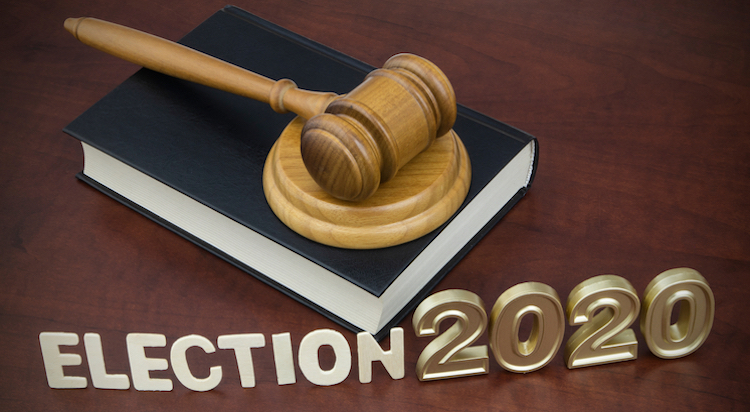In election cases, Trump-appointed judges rule against Trump and allies, express skepticism

Image from Shutterstock.com.
President Donald Trump’s campaign and those who support it have faced dozens of losses and skeptical judges, including some judges appointed by Trump.
According to a tally by the Associated Press, the Trump campaign and Trump’s allies have brought about 50 election lawsuits. More than 30 have been rejected or dropped. The only victory was in a case challenging a changed deadline for providing missing identification on certain absentee and mail-in ballots.
Josh Blackman, a professor at the South Texas College of Law in Houston, wrote about several of the election decisions involving Trump appointees in a post for the Volokh Conspiracy.
Blackman lists these cases involving Trump appointees:
• In a Nov. 27 decision, the 3rd U.S. Circuit Court of Appeals at Philadelphia rejected a bid to decertify Pennsylvania’s election results by the Trump campaign. The author of the opinion was Judge Stephanos Bibas, a Trump appointee.
“Charges of unfairness are serious,” Bibas wrote in the nonprecedential opinion. “But calling an election unfair does not make it so. Charges require specific allegations and then proof. We have neither here.”
• In a Dec. 4 decision, the 11th Circuit at Atlanta ruled that it had no jurisdiction in an appeal seeking to decertify election results in Georgia, according to Law & Crime. The ruling left undisturbed a federal judge’s emergency order blocking alteration of Dominion Voting Systems voting machine software in three counties in a suit alleging massive vote fraud in Georgia.
The author of the opinion was a Trump appointee, Judge Andrew Brasher. He said the district judge “worked at a breakneck pace” and was ready to enter an appealable order on the merits after agreeing to the plaintiffs’ request to keep the voting machines intact.
“But the plaintiffs would not take the district court’s ‘yes’ for an answer,” Brasher wrote. “They appealed instead.”
Brasher described the litigation as “last minute” and said it sought “sweeping relief.” But the issue is a narrow question of jurisdiction, and the appeals court did not have jurisdiction to review the judge’s order, he said.
• U.S. District Judge Brett Ludwig, a Trump appointee, said a lawsuit seeking to overturn President-elect Joe Biden’s win in Wisconsin had made “a request for pretty remarkable declaratory relief” by asking the judge to “remand” the lawsuit to the state legislature. The Associated Press and the Milwaukee Journal Sentinel had coverage.
“I have a very, very hard time seeing how this is justiciable in the federal court,” Ludwig said. “The request to remand this case to the legislature almost strikes me as bizarre.”
Ludwig asked why Trump didn’t go directly to the legislature with his request.
Republican-appointed judges have ruled against the Trump campaign and its allies in other suits, including a 3rd Circuit ruling on standing that has been cited in other lawsuits. An 11th Circuit panel that refused to block Georgia vote certification Saturday included two judges on Trump’s short lists for U.S. Supreme Court seats after the deaths of Justices Antonin Scalia and Ruth Bader Ginsburg.
The short list judges were Chief Judge William Pryor and Judge Barbara Lagoa. The decision, written by Pryor, said the Georgia voter who sued to stop certification of the Georgia election results did not have standing, and his requests for relief concerning the 2020 election were moot because Georgia had already certified the election results and its slate of presidential electors.
Hat tip to How Appealing.
Write a letter to the editor, share a story tip or update, or report an error.


